At Frontier Nursing University, we educate students to provide care to all individuals with an emphasis in rural and underserved communities. FNU Family Nurse Practitioner (FNP) student and U.S. Navy veteran Robyn Roche-Paull, BSN, RNC-MNN, IBCLC is doing just that with the underserved community she belongs to, and has been for several years now.
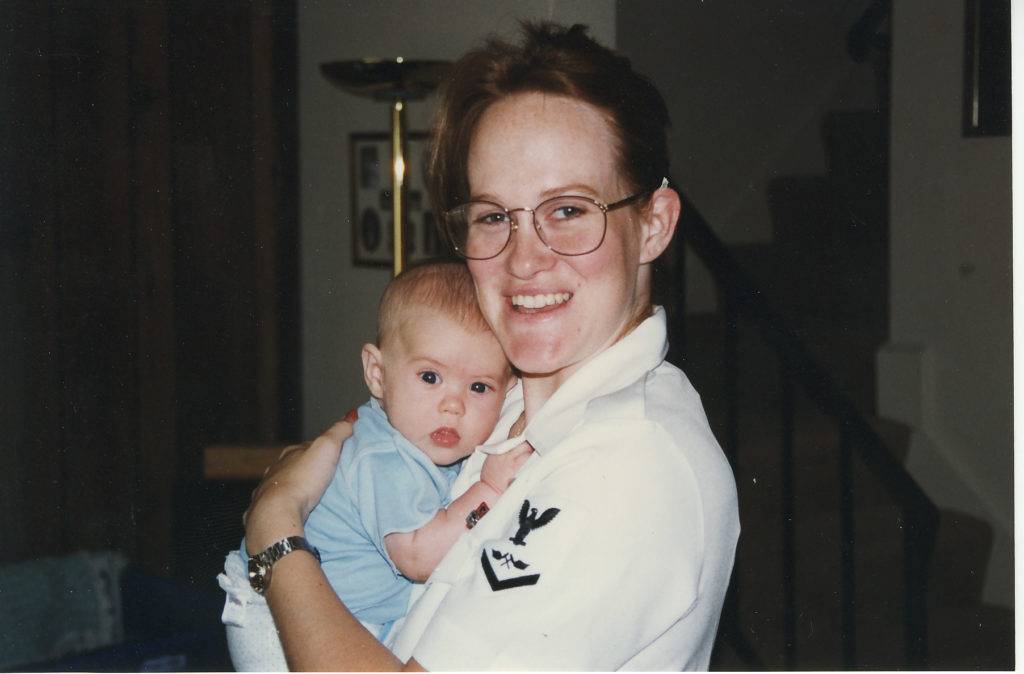 Roche-Paull didn’t start out in the healthcare field. She was an aircraft mechanic in the U.S. Navy for six years. During this time, she met her husband and had her first child while on active duty, which brought on some major challenges. There was a lack of support and understanding for childbirth, breastfeeding, and caring for a child while on active duty. Policies weren’t in place, and it was expected that you return to your deployment six weeks after giving birth.
Roche-Paull didn’t start out in the healthcare field. She was an aircraft mechanic in the U.S. Navy for six years. During this time, she met her husband and had her first child while on active duty, which brought on some major challenges. There was a lack of support and understanding for childbirth, breastfeeding, and caring for a child while on active duty. Policies weren’t in place, and it was expected that you return to your deployment six weeks after giving birth.
Once her enlistment was up, Roche-Paull left the military and went to get her degree using her GI Bill. While getting her bachelor’s degree in human lactation, she began doing volunteer work, helping new moms work through breastfeeding.
“I found I had a knack for helping others,” Roche-Paull said.
To complete her degree, she had to do a special project; she chose to do a pamphlet for active-duty women on breastfeeding in the military. This pamphlet turned into a 50-page PDF, which turned into a book!
“Breastfeeding in Combat Boots: A Survival Guide to Successful Breastfeeding While Serving in the Military” helps pregnant people in the military navigate breastfeeding while working through their long shifts, trainings, and deployment. The guide helps new active-duty moms successfully breastfeed their babies. At the same time, Roche-Paull launched a non-profit virtual consultation organization under the same name as the book and received her certification as a Lactation Consultant.
She visited military bases and gave talks to healthcare personnel and commanders on how to support breastfeeding women. Today, there are more policies in place to support and help breastfeeding women, but that was not the case in the late nineties to early 2000s.
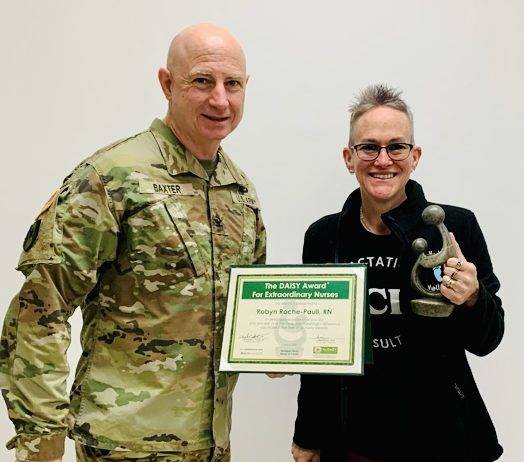 Soon after, Roche-Paull went back to school to receive her Bachelor of Science in Nursing (BSN) to become a registered nurse. She has since worked in labor and delivery and as a postpartum nurse. She is a two-time Daisy Award winner. Currently, she is solely a lactation consultant at Madigan Army Medical Center in Washington.
Soon after, Roche-Paull went back to school to receive her Bachelor of Science in Nursing (BSN) to become a registered nurse. She has since worked in labor and delivery and as a postpartum nurse. She is a two-time Daisy Award winner. Currently, she is solely a lactation consultant at Madigan Army Medical Center in Washington.
Roche-Paull calls herself a perpetual student. She began working towards her advanced practice registered nurse (APRN) degree to become a family nurse practitioner in 2020.
“I want to become a family nurse practitioner. I want to be able to do more because right now I am limited; I can’t diagnose, and I can’t treat,” Roche-Paull said.
We asked Roche-Paull why she chose the Family Nursing track over the Nurse-Midwifery or Women’s Health Care Nurse Practitioner specialty.
“Something people don’t realize is that you are taking care of mom and baby,” Roche-Paull said. “They are a dyad. You can’t work with one and not have the other included.”
Thus, Roche-Paull is working to become an FNP to be able to address the full picture and treat both mom and baby, rather than piecing the care together with several different providers.
“Midwives only see the baby up to six weeks, Pediatricians only see the child and obstetrician’s only see the birth parent, but breastfeeding can and should go on a lot longer,” Roche-Paull said.
 Once she graduates, Roche-Paull hopes to open a Lactation Clinic that is run by an FNP for military people. She hopes this clinic is a “one-stop shop” for pregnant people wanting to breastfeed and that she can see them during pregnancy and after. She also hopes to offer support groups through this venture.
Once she graduates, Roche-Paull hopes to open a Lactation Clinic that is run by an FNP for military people. She hopes this clinic is a “one-stop shop” for pregnant people wanting to breastfeed and that she can see them during pregnancy and after. She also hopes to offer support groups through this venture.
“I know that Frontier really focuses on serving underserved communities, and I really feel like this truly is an underserved community. It’s not one that you think of right away, but it is,” Roche-Paull said.
SIG meetings are held monthly and are facilitated by faculty, but students drive the goals and purposes of each SIG. During the meetings, the group talks about current issues and offers support to each other.
“We want to have a community because if you are not a veteran or haven’t served there are just certain things you don’t understand,” Roche-Paull said. “It’s nice being able to talk to other people who have been through what you have been through.”
Veterans Day is on November 11th. Roche-Paull offered some advice to healthcare professionals:
Ask your patient if they have any military service at intake, especially if you don’t have any military bases nearby.
Research how military service affects individuals; especially the psychological effects from PTSD and other issues like sexual assault or sexual harassment.
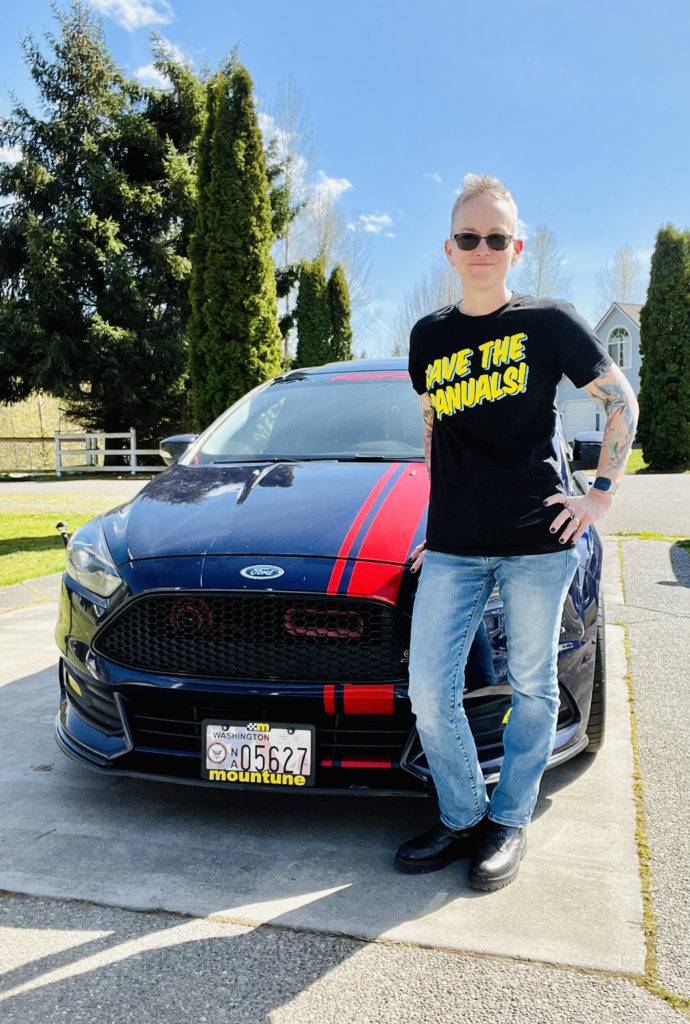 She also asks that everyone recognize that women are veterans too.
She also asks that everyone recognize that women are veterans too.
Roche-Paull and her spouse have three children and five cats. When she’s not working, you can find her on the leaderboard of a Peloton class, doing photography, or working on or racing her sports car. All this while sipping on an iced coffee, probably.
Another goal for the perpetual learner? Returning to FNU to get a Post-Graduate Certificate (PGC) in Psychiatric-Mental Health to better serve the perinatal population.
“I chose Frontier because I have run into so many people who have gone there. Everybody told me ‘go to Frontier!,” Roche-Paull said. “I love the ability that I can go to school when I can fit it into my very busy schedule.”
Robyn, thank you for recognizing this underserved community and providing care to pregnant veterans or service members!
To learn more about FNU’s top-ranked FNP program visit our website.
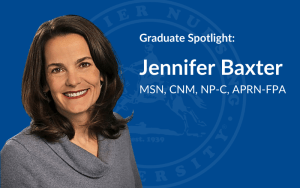
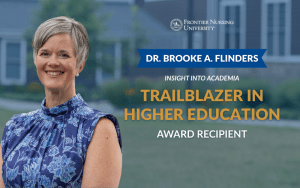




















 Carrie Belin is an experienced board-certified Family Nurse Practitioner and a graduate of the Johns Hopkins DNP program, Johns Hopkins Bloomberg School of Public Health, Georgetown University School of Nursing, and Johns Hopkins School of Nursing. She has also completed fellowships at Georgetown and the University of California Irvine.
Carrie Belin is an experienced board-certified Family Nurse Practitioner and a graduate of the Johns Hopkins DNP program, Johns Hopkins Bloomberg School of Public Health, Georgetown University School of Nursing, and Johns Hopkins School of Nursing. She has also completed fellowships at Georgetown and the University of California Irvine. Angie has been a full-scope midwife since 2009. She has experience in various birth settings including home, hospital, and birth centers. She is committed to integrating the midwifery model of care in the US. She completed her master’s degree in nurse-midwifery at Frontier Nursing University (FNU) and her Doctorate at Johns Hopkins University. She currently serves as the midwifery clinical faculty at FNU. Angie is motivated by the desire to improve the quality of healthcare and has led quality improvement projects on skin-to-skin implementation, labor induction, and improving transfer of care practices between hospital and community midwives. In 2017, she created a short film on skin-to-skin called
Angie has been a full-scope midwife since 2009. She has experience in various birth settings including home, hospital, and birth centers. She is committed to integrating the midwifery model of care in the US. She completed her master’s degree in nurse-midwifery at Frontier Nursing University (FNU) and her Doctorate at Johns Hopkins University. She currently serves as the midwifery clinical faculty at FNU. Angie is motivated by the desire to improve the quality of healthcare and has led quality improvement projects on skin-to-skin implementation, labor induction, and improving transfer of care practices between hospital and community midwives. In 2017, she created a short film on skin-to-skin called 










 Justin C. Daily, BSN, RN, has ten years of experience in nursing. At the start of his nursing career, Justin worked as a floor nurse on the oncology floor at St. Francis. He then spent two years as the Director of Nursing in a small rural Kansas hospital before returning to St. Francis and the oncology unit. He has been in his current position as the Chemo Nurse Educator for the past four years. He earned an Associate in Nurse from Hutchinson Community College and a Bachelor of Science in Nursing from Bethel College.
Justin C. Daily, BSN, RN, has ten years of experience in nursing. At the start of his nursing career, Justin worked as a floor nurse on the oncology floor at St. Francis. He then spent two years as the Director of Nursing in a small rural Kansas hospital before returning to St. Francis and the oncology unit. He has been in his current position as the Chemo Nurse Educator for the past four years. He earned an Associate in Nurse from Hutchinson Community College and a Bachelor of Science in Nursing from Bethel College. Brandy Jackson serves as the Director of Undergraduate Nursing Programs and Assistant Educator at Wichita State University and Co-Director of Access in Nursing. Brandy is a seasoned educator with over 15 years of experience. Before entering academia, Brandy served in Hospital-based leadership and Critical Care Staff nurse roles. Brandy is passionate about equity in nursing education with a focus on individuals with disabilities. Her current research interests include accommodations of nursing students with disabilities in clinical learning environments and breaking down barriers for historically unrepresented individuals to enter the nursing profession. Brandy is also actively engaged in Interprofessional Education development, creating IPE opportunities for faculty and students at Wichita State. Brandy is an active member of Wichita Women for Good and Soroptimist, with the goal to empower women and girls. Brandy is a TeamSTEPPS master trainer. She received the DASIY Award for Extraordinary Nursing Faculty in 2019 at Wichita State University.
Brandy Jackson serves as the Director of Undergraduate Nursing Programs and Assistant Educator at Wichita State University and Co-Director of Access in Nursing. Brandy is a seasoned educator with over 15 years of experience. Before entering academia, Brandy served in Hospital-based leadership and Critical Care Staff nurse roles. Brandy is passionate about equity in nursing education with a focus on individuals with disabilities. Her current research interests include accommodations of nursing students with disabilities in clinical learning environments and breaking down barriers for historically unrepresented individuals to enter the nursing profession. Brandy is also actively engaged in Interprofessional Education development, creating IPE opportunities for faculty and students at Wichita State. Brandy is an active member of Wichita Women for Good and Soroptimist, with the goal to empower women and girls. Brandy is a TeamSTEPPS master trainer. She received the DASIY Award for Extraordinary Nursing Faculty in 2019 at Wichita State University.  Dr. Sabrina Ali Jamal-Eddine is an Arab-disabled queer woman of color with a PhD in Nursing and an interdisciplinary certificate in Disability Ethics from the University of Illinois Chicago (UIC). Dr. Jamal-Eddine’s doctoral research explored spoken word poetry as a form of critical narrative pedagogy to educate nursing students about disability, ableism, and disability justice. Dr. Jamal-Eddine now serves as a Postdoctoral Research Associate in UIC’s Department of Disability and Human Development and serves on the Board of Directors of the National Organization of Nurses with Disabilities (NOND). During her doctoral program, Sabrina served as a Summer Fellow at a residential National Endowment of the Humanities (NEH) Summer Institute at Arizona State University (2023), a summer fellow at Andrew W. Mellon’s National Humanities Without Walls program at University of Michigan (2022), a Summer Research Fellow at UC Berkeley’s Othering & Belonging Institute (2021), and an Illinois Leadership Education in Neurodevelopmental and related Disabilities (LEND) trainee (2019-2020).
Dr. Sabrina Ali Jamal-Eddine is an Arab-disabled queer woman of color with a PhD in Nursing and an interdisciplinary certificate in Disability Ethics from the University of Illinois Chicago (UIC). Dr. Jamal-Eddine’s doctoral research explored spoken word poetry as a form of critical narrative pedagogy to educate nursing students about disability, ableism, and disability justice. Dr. Jamal-Eddine now serves as a Postdoctoral Research Associate in UIC’s Department of Disability and Human Development and serves on the Board of Directors of the National Organization of Nurses with Disabilities (NOND). During her doctoral program, Sabrina served as a Summer Fellow at a residential National Endowment of the Humanities (NEH) Summer Institute at Arizona State University (2023), a summer fellow at Andrew W. Mellon’s National Humanities Without Walls program at University of Michigan (2022), a Summer Research Fellow at UC Berkeley’s Othering & Belonging Institute (2021), and an Illinois Leadership Education in Neurodevelopmental and related Disabilities (LEND) trainee (2019-2020). Vanessa Cameron works for Vanderbilt University Medical Center in Nursing Education & Professional Development. She is also attending George Washington University and progressing towards a PhD in Nursing with an emphasis on ableism in nursing. After becoming disabled in April 2021, Vanessa’s worldview and perspective changed, and a recognition of the ableism present within healthcare and within the culture of nursing was apparent. She has been working since that time to provide educational foundations for nurses about disability and ableism, provide support for fellow disabled nursing colleagues, and advocate for the disabled community within healthcare settings to reduce disparities.
Vanessa Cameron works for Vanderbilt University Medical Center in Nursing Education & Professional Development. She is also attending George Washington University and progressing towards a PhD in Nursing with an emphasis on ableism in nursing. After becoming disabled in April 2021, Vanessa’s worldview and perspective changed, and a recognition of the ableism present within healthcare and within the culture of nursing was apparent. She has been working since that time to provide educational foundations for nurses about disability and ableism, provide support for fellow disabled nursing colleagues, and advocate for the disabled community within healthcare settings to reduce disparities. Dr. Lucinda Canty is a certified nurse-midwife, Associate Professor of Nursing, and Director of the Seedworks Health Equity in Nursing Program at the University of Massachusetts Amherst. She earned a bachelor’s degree in nursing from Columbia University, a master’s degree from Yale University, specializing in nurse-midwifery, and a PhD from the University of Connecticut. Dr. Canty has provided reproductive health care for over 29 years. Her research interests include the prevention of maternal mortality and severe maternal morbidity, reducing racial and ethnic health disparities in reproductive health, promoting diversity in nursing, and eliminating racism in nursing and midwifery.
Dr. Lucinda Canty is a certified nurse-midwife, Associate Professor of Nursing, and Director of the Seedworks Health Equity in Nursing Program at the University of Massachusetts Amherst. She earned a bachelor’s degree in nursing from Columbia University, a master’s degree from Yale University, specializing in nurse-midwifery, and a PhD from the University of Connecticut. Dr. Canty has provided reproductive health care for over 29 years. Her research interests include the prevention of maternal mortality and severe maternal morbidity, reducing racial and ethnic health disparities in reproductive health, promoting diversity in nursing, and eliminating racism in nursing and midwifery. Dr. Lisa Meeks is a distinguished scholar and leader whose unwavering commitment to inclusivity and excellence has significantly influenced the landscape of health professions education and accessibility. She is the founder and executive director of the DocsWithDisabilities Initiative and holds appointments as an Associate Professor in the Departments of Learning Health Sciences and Family Medicine at the University of Michigan.
Dr. Lisa Meeks is a distinguished scholar and leader whose unwavering commitment to inclusivity and excellence has significantly influenced the landscape of health professions education and accessibility. She is the founder and executive director of the DocsWithDisabilities Initiative and holds appointments as an Associate Professor in the Departments of Learning Health Sciences and Family Medicine at the University of Michigan. Dr. Nikia Grayson, DNP, MSN, MPH, MA, CNM, FNP-C, FACNM (she/her) is a trailblazing force in reproductive justice, blending her expertise as a public health activist, anthropologist, and family nurse-midwife to champion the rights and health of underserved communities. Graduating with distinction from Howard University, Nikia holds a bachelor’s degree in communications and a master’s degree in public health. Her academic journey also led her to the University of Memphis, where she earned a master’s in medical anthropology, and the University of Tennessee, where she achieved both a master’s in nursing and a doctorate in nursing practice. Complementing her extensive education, she completed a post-master’s certificate in midwifery at Frontier Nursing University.
Dr. Nikia Grayson, DNP, MSN, MPH, MA, CNM, FNP-C, FACNM (she/her) is a trailblazing force in reproductive justice, blending her expertise as a public health activist, anthropologist, and family nurse-midwife to champion the rights and health of underserved communities. Graduating with distinction from Howard University, Nikia holds a bachelor’s degree in communications and a master’s degree in public health. Her academic journey also led her to the University of Memphis, where she earned a master’s in medical anthropology, and the University of Tennessee, where she achieved both a master’s in nursing and a doctorate in nursing practice. Complementing her extensive education, she completed a post-master’s certificate in midwifery at Frontier Nursing University.









 Dr. Tia Brown McNair is the Vice President in the Office of Diversity, Equity, and Student Success and Executive Director for the Truth, Racial Healing, and Transformation (TRHT) Campus Centers at the American Association of Colleges and Universities (AAC&U) in Washington, DC. She oversees both funded projects and AAC&U’s continuing programs on equity, inclusive excellence, high-impact practices, and student success. McNair directs AAC&U’s Summer Institutes on High-Impact Practices and Student Success, and TRHT Campus Centers and serves as the project director for several AAC&U initiatives, including the development of a TRHT-focused campus climate toolkit. She is the lead author of From Equity Talk to Equity Walk: Expanding Practitioner Knowledge for Racial Justice in Higher Education (January 2020) and Becoming a Student-Ready College: A New Culture of Leadership for Student Success (July 2016 and August 2022 Second edition).
Dr. Tia Brown McNair is the Vice President in the Office of Diversity, Equity, and Student Success and Executive Director for the Truth, Racial Healing, and Transformation (TRHT) Campus Centers at the American Association of Colleges and Universities (AAC&U) in Washington, DC. She oversees both funded projects and AAC&U’s continuing programs on equity, inclusive excellence, high-impact practices, and student success. McNair directs AAC&U’s Summer Institutes on High-Impact Practices and Student Success, and TRHT Campus Centers and serves as the project director for several AAC&U initiatives, including the development of a TRHT-focused campus climate toolkit. She is the lead author of From Equity Talk to Equity Walk: Expanding Practitioner Knowledge for Racial Justice in Higher Education (January 2020) and Becoming a Student-Ready College: A New Culture of Leadership for Student Success (July 2016 and August 2022 Second edition).